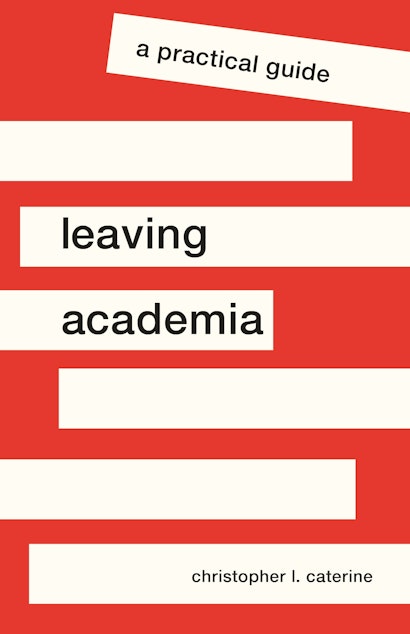Two distinct challenges stood in my way when I began to consider leaving academia. The first was psychological. By that point in 2015, my entire identity was bound up in my scholarly work. Consequently, I wasn’t just unsure of what I would do if I wasn’t a professor; I didn’t know who I would be. The second challenge was tactical. I had no idea how to look for jobs outside higher education, let alone how to develop skills that were relevant to a world so different from the one I knew.
The resources available at that time left me wanting. Advice was either so matter-of-fact that it seemed irrelevant to someone despairing of his future or so concerned with how a departure from academia felt that it never proposed a helpful path forward.
I wrote Leaving Academia: A Practical Guide to bridge this gap. In it, I use the psychological arc of my own career change—and anecdotes from others—to frame actionable guidance for each step on the path to a new profession:
- Dread: Confronting the prospect of not being an academic
- Discern: Exploring what you want out of life
- Discover: Learning what careers are viable
- Decipher: Translating your experience for new audiences
- Develop: Building new skills for jobs you want
- Deploy: Adapting to a new professional environment
This framework distills guidance I received from the roughly 150 people I met during my search for a new career and the 12 former academics I interviewed while writing my book. It also tries to catch lightning in a bottle. I felt it would be a shame for so many people to have invested so many hours for one person to find a job. Leaving Academia is my way of amplifying the value of their investment for the benefit of others who continue to need it.
Of course, the world of 2020 is quite different from that of 2015. Some of you may be wondering whether advice developed in the “before times” still holds currency today. I did, too. To find out, I recently met with eight academics who have left academia or are reassessing their place within it as a result of COVID-19.
These conversations revealed two things. First, the pandemic did not fundamentally alter the scheme of activities I outline in my book — though it did upend their order. Second, academics who have found (hope of) a new career in this brave new world share an impulse to use social media and other digital tools to ask, to experiment, and to act. During a time when so many have been compelled to seek a quick exit from higher education, it is essential for others to learn from their example.
Ask
Academics are acculturated to answer their own questions, but this habit can hinder career change. To discover a path forward and decipher your skills for new audiences, you need to solicit as many sources as you can for guidance
Twitter and LinkedIn are essential. Courtney Hill (PhD, civil engineering) used these platforms to fill her calendar with informational interviews by posting an open request for advice. She has found that people who survived the 2008 recession are especially responsive. Kelly Moench (PhD, neuroscience and psychology) did the same—and even met someone who interviewed for a job she was seeking. That individual coached her on the hiring process, and Kelly went on to land the role.
You can also use social media to follow career coaches, graduate professional development centers, learned societies, and collectives of PhDs in non-academic fields. Comment freely on their posts, and if you strike up a discussion with the author, connect on LinkedIn to chat at greater length. Just remember to include an explanatory note with your request if you haven’t spoken with someone before.
Experiment
Success in a career change often starts with failure. Muddling through the learning process is how you develop new skills—and how you create opportunities to deploy in a new role.
Maryam Salehijam (PhD, international business law) demonstrates this point well. She began composing LinkedIn articles about technology to learn the subject matter and build a portfolio of non-academic writing. Soon, she solicited CEOs at companies she admired for interviews. This gambit earned her access she never could have secured otherwise. One such meeting even led to a job interview.
It’s helpful to start with activities that excite you. Erynn Masi de Casanova (PhD, sociology) realized that she wanted to put academic “side projects” like mentoring and organizing cross-disciplinary encounters at the core of her career. This summer, she left her full professorship (!) to head research, professional development, and academic affairs for the American Sociological Association.
Act
The panic that many of us feel in the face of the current crisis has one benefit: it jolts us from complacency. Academics I’ve spoken with recently seem more inclined to leap into the unknown than they did nine months ago. In taking those risks, they often develop new skills and discover new career paths simultaneously.
One humanities PhD found work in intelligence by knowing a language the government deems strategic. Though only weeks into the job, this person is already applying their analytical skills to critical problems and finding more collegiality than they did in academia.
Eric Stephens (PhD, Rhetorics, Composition, and Information Design) is a remarkable example of channeling panic into practice. A one-hour meeting he organized for out-of-work academics recently grew into a two-day conference featuring fifty speakers. This unemployed professor, living in his parents’ basement with his wife and three children, now has experience in event planning, digital marketing, volunteer recruitment, fundraising, and managing a distributed team. While admittedly unusual, Eric shows how quickly you can build professional skills, a public reputation, and a powerful movement without ever leaving home.
The immediate crisis of the pandemic has denied the quiet that is necessary for deep reflection. Many of us are either consumed by dread or hustling so much that we barely process it. In that sense, COVID-19 has exacerbated the need for a resource that emphasizes the emotional toll of leaving academia and provides practical guidance to carry on.
But while the pandemic may have delayed our ability to discern how we feel about the evolving career paths before us, it cannot suppress new insights. Monica Cox (PhD, leadership and policy studies; MS, industrial engineering) manifests this hope. Staying home during quarantine allowed her to realize how tiring it is to code switch between private life and academic work as a Black woman. She is now putting her epiphany into action by helping the next generation of diverse academic leaders bring their authentic selves to every sphere they occupy.
Monica admits that job stability enabled these insights, but the type of clarity she describes is common. Almost everyone who changes careers reports that it takes time to contextualize their experience and figure out how they feel about their new circumstances.
Put differently, leaving academia is always a process. That was true in 2015, and it remains true today. The greatest challenge is often being patient for an epiphany—the moment we perceive order in the chaotic events of our past. Strategic effort can nevertheless help that understanding along. Those who ask, experiment, and act rapidly gain new perspectives that enable them discern the values that motivate their work—and uncover opportunities that align more closely with their hopes.
Christopher L. Caterine is a communications strategist, writer, and career coach. Since leaving academia, he has helped many graduate students and scholars find satisfying work in new arenas. Twitter @clcaterine

